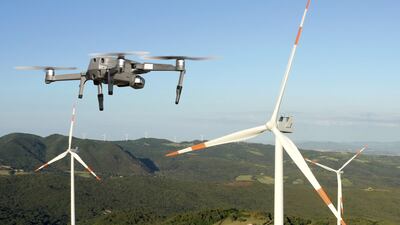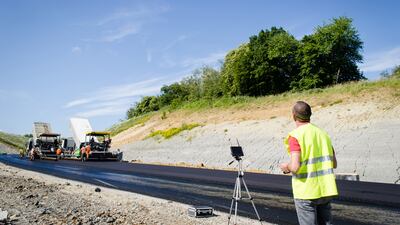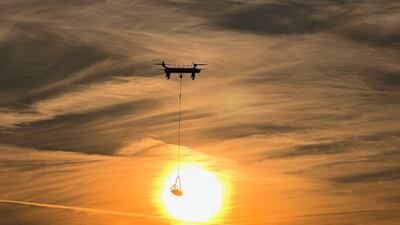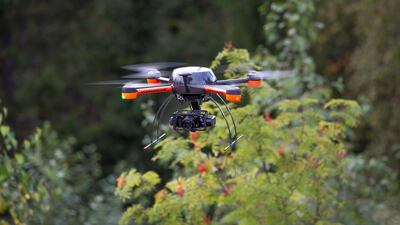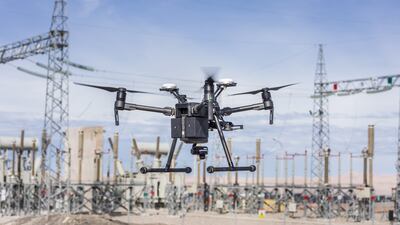Visions for drone superhighways across the UK are being tied down by regulations that are proving a major hindrance to growth, industry experts have told The National.
Manufacturers are hitting roadblocks in trying to get their devices off the ground because of outdated rules, campaigners said as they called for a shake-up of the process.
They are urging the authorities to take immediate action to save an industry that is "bleeding to death".
The Drone Delivery Group, made up of more than 400 industry leaders, handed a report to the government urging ministers to take an in-depth look at the rules governing the use of unmanned aerial vehicles.
The lack of cohesion in regulations for use of drones in land, sea and air should be addressed by the introduction of a “streamlined and harmonised” regulation and standards system, they said, adding that such a move is vital if the industry is going to grow to its full potential in the coming years.
Robert Garbett, chairman of the group and one of the world’s leading advisers on drone technology, told The National the current rules are a hindrance rather than an enabler.
He said a change in approach is needed to make Britain's vision for drone superhighways a success.

What are drone superhighways?
Drone superhighways would consist of a protected airspace that provide companies with long distances in which to safely fly their devices to adequately test them. They could play host to drones used in a commercial manner to take goods from one location to another.
Last July, the government gave the green light for the world’s largest and longest network of drone superhighways to be built, linking cities and towns throughout the Midlands to the South-East of England.
A consortium that includes EE, BT and tech start-ups will build and develop 265km of pathways connecting airspace above Reading, Oxford, Milton Keynes, Cambridge, Coventry and Rugby over two years.
The project announced at the Farnborough Airshow has the option of extending the corridors to other locations in Britain.
The superhighways would only be possible with the same set of standards and regulations across land, sea and air, the Drone Delivery Group said.
Under the current rules, a manufacturer will have to abide by different standards depending on the nature of the device being used ― whether it is on land, in the air or underwater.
“Safety principles are not being harmonised,” Mr Garbett said. “There’s nothing that’s common.
“This has been put to the government so many times it’s unbelievable.”
He urged the government to step up to help the industry grow into the world-class example it has the potential to become, and warned a lack of action means the UK economy is missing out on billions of pounds each year.
'Drone industry is bleeding to death'
Currently, if a company has developed an unmanned aerial vehicle, it has to request permission from the Civil Aviation Authority to carry out a trial before it can be put on to the market to be sold.
The CAA oversees a wide range of areas in aviation, including supervising the issue of pilots’ licences, testing equipment and carrying out inspections.
Drone manufacturers have to submit huge amounts of paperwork to prove that their device complies with the terms of the International Organisation for Standardisation. Instead, drone experts say, this should be a mere box-ticking exercise that confirms the device meets international standards and the company is audited on a regular basis. This would enable testing permission to be swiftly given, the Drone Delivery Group said.
Mr Garbett said companies are growing frustrated at the long delays to obtain permission to test their new devices and are moving abroad, taking jobs with them.
“It’s too slow and too restrictive to test the drones in the UK because the CAA is overloaded,” Mr Garbett said. “They do a great job, but they are overstretched.
“It’s causing the biggest hold-up in the entire process [of drone development].
“Manufacturers are leaving the UK and moving to Turkey because it takes too long for them to get permission to trial drones.
“This is a very, very fast-moving industry and the technology is advancing rapidly.
“We can save ourselves time and money if the regulations are thinned out. Regulations should be thin, not too complex, because a regulation is very hard to change.
“We want standards and regulations to be streamlined and harmonised across the system. It could add billions to the UK economy and create hundreds of thousands of jobs.
“The government must rescue the UK [drone] industry because it’s bleeding to death.”
Mr Garbett said while the Conservative government has in recent years invested in drone technology, it is “not looking at the wider picture”.
“They are not interested in the commercialisation of drones, they are just throwing money at trials,” he said. “If you carry on trialling you will go round and round the loop.”
John Haffenden, chief executive of the Drone Delivery Group, said a change in approach from the government is vital to ensure "operational chaos" can be avoided in the future.
"Without a solid strategy, operational chaos, reduced safety and data security will be the result in what will continue to be a predominantly manned transport environment," he added.
'Drones delivering pizza is a fantasy'
Mr Garbett also wants new infrastructure put in place for the commercialisation of drones, which he said will have a positive effect on the environment and people’s quality of life.
While he said the notion of drones being used to deliver pizza, coffee and shopping to people’s homes on a wide scale is “just a fantasy”, there are huge opportunities elsewhere.
“It’s not practical, it’s not safe, it’s not commercially viable, and it’s not socially acceptable,” he said of using drones to deliver takeaways. “You will have people complaining that the cameras on these drones delivering to their neighbours can capture them in their back gardens.”
His vision for the commercialisation of drones in the UK would look more like business making use of waterways as opposed to roads to transport goods.
“We should start to use the Thames again and take cargo off the road,” he said. “There are big lorries carrying goods on our roads and the Thames is empty. We’re not using our infrastructure wisely.

“Use drones to lift cargo off barges and transport it along the Thames to its destination. It will reduce the number of white vans on our roads.”
Mr Garbett said if the UK does not want to be left behind in the global expansion of drone use in the commercial world the government needs to act now.
“Drone technology can also reduce carbon emissions by 2.4 million tonnes, but none of this will be possible unless the UK changes the way that it regulates drones across land, sea and air, with safety and the security of data being the main priorities,” he said. “It is vital that the government acts now to firmly establish the UK as an industry leader in drone technology.”
In a statement to The National, a representative of the Department for Transport said: “We are working to develop the UK’s drone industry, which has the potential to deliver huge economic and environmental benefits to communities across the country.”
The CAA told The National: “The Civil Aviation Authority regulates proportionately to make UK aviation safe.
"This approach has enabled many UK companies to successfully and safely test, develop and evaluate drones of all sizes and complexities.
"We work closely with other international bodies setting out standards for drones to support the safe growth of the drone sector around the world.”
